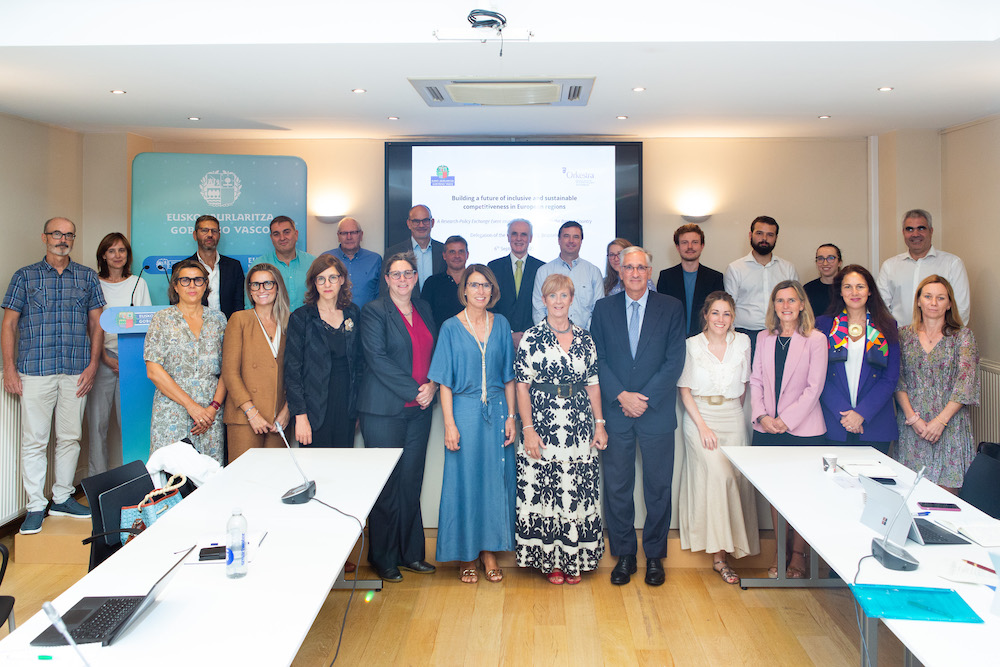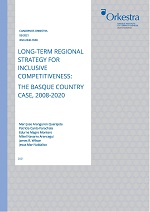18 September 2023

Image: Irekia
The Basque Delegation of the European Union and Orkestra have organised an international seminar in which several experts have reflected on the keys to the success of the Basque territorial strategy and the challenges facing European industrial regions.
The commitment to industry, multilevel governance and the promotion of public-private collaboration were some of the success factors highlighted by the participants.
Among the challenges facing industrial regions such as the Basque Country, they highlighted the need to promote an ambitious innovation policy, bring the skills system closer to industry and strengthen aid and collaboration mechanisms for SMEs.
The Basque Government and Orkestra have organised an international seminar in Brussels to reflect on how to build a future of inclusive and sustainable competitiveness in European regions, inspired by various research studies that analyse the experience of the Basque Country.
The meeting took place at the headquarters of the Basque Delegation of the European Union and brought together representatives of organisations such as the European Commission, the World Bank, the OECD and the Flemish Government, as well as researchers from the Universities of Arizona State, Cardiff, Harvard, Deusto and Oporto, among others.
The opening session, which focused on the Basque Country case, included contributions by the Basque Government's Minister for Economic Development, Sustainability and the Environment, Arantxa Tapia; Xabier Goenaga, Head of Unit at the European Commission's Joint Research Centre (JRC); as well as the General Director and the Research Director at Orkestra, Mari Jose Aranguren and James Wilson.
Long-term regional strategy for inclusive competitiveness: The Basque Country case, 2008-2020
This paper explores the main features and challenges going forward of the Basque Country’s strategy for inclusive competitiveness, and identifies lessons that other regions can learn from the Basque experience.
This was followed by two sessions in which experts analysed the particularities of Basque innovation, entrepreneurship and skills ecosystems, and delved into the role of SMEs and clusters as levers of competitiveness.
The various presentations highlighted the fact that the Basque Country is one of the few regions that has developed a territorial strategy focused on industry over several decades and that has evolved in response to social needs and circumstances.
Among the success factors that have enabled this strategy to generate solid results in the Basque Country, the participants highlighted the commitment to industrial development, the pluralism provided by multilevel governance and the leadership of economic development policies closely linked to knowledge entities. In addition, they underlined the omnipresent role of public-private cooperation, the responsibility and capacity of government and a very strong cultural identity.
5 key areas for the future
The meeting also served to reflect on the future and identify five key areas that should guide the construction of the next stage of the Basque competitiveness strategy in a context of major socio-economic challenges.
Firstly, the importance of maintaining an ambitious innovation policy and integrating new actors into the innovation system in order to work together on public policies that help face new societal challenges, such as the ageing process or sustainability.
As for SMEs and clusters, studies have shown that Basque SMEs tend to be "listened to" by policy makers through mechanisms such as cluster initiatives. In the future, it will be particularly important to strengthen support and collaboration mechanisms with these companies in an increasingly complex regulatory context.
Regarding the skills ecosystem, the strengths of the Basque VET system and initiatives such as Bizkaia Talent have been highlighted, as well as the strengthening of this initiative through the development of the Basque Talent strategy. The focus has also been placed on the need to reduce the skills mismatch between education and industry, which requires anticipating future needs and working on critical links.
Public-private collaboration and the governance model are one of the strengths of the Basque Country. However, new societal challenges, such as the energy-climate transition, require more than ever that citizens become agents of change, so the integration of public-private-individual collaboration will be fundamental.
Finally, it is necessary to think beyond the Basque Country in terms of value chains and connections between clusters, as well as to strengthen collaboration between European regions.
Next steps
All these learnings can also be useful for other European regions facing similar challenges, thus the meeting in Brussels opens the way to explore new opportunities between the participating institutions and regions. Moreover, the conclusions of the event will feed into policy decision-making processes and will serve to design new research projects that contribute to fostering more inclusive and sustainable competitiveness in the Basque Country.













